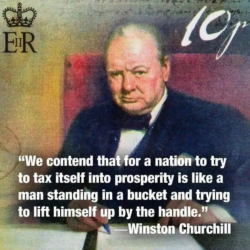CaptJCool
Established Member
- Joined
- May 31, 2012
- Posts
- 3,989
I’m still none the wiser
No to GST UPLIFT as it’s a regressive tax
Lower income taxes they are too high. Both majors know the average worker is soaked. Taxes when you earn and taxes when you spend
Yes to raising taxes on things that wealth create. Founders shares and property
The franking credit idea is in my view a blunt instrument and doesn’t impact the big investors who pay tax and partially affects SMSF with balances above $1.6 million
Share transaction taxes would be a good thing.
Raise subdivision stamp duty
The simple trick would to calculate taxable income on all income instead of not including it and give a tax offset for exempt income like superannuation
Why ?
In ‘retirement’ there are multiple buckets.
1. Your super below $1.6 million
2. Your super above $1.6 million
3. Investments outside super
4. Inheritances
5. Other people’s money paying Medicare, home care, aged care, seniors health card (based on taxable income)
6. Any wage earnings because you went back to work
7. Age Pension (based on accounting income)
A person may have one or more of these. But we are talking about aged Australians affected by the ban on women working after they married, the expectation of non-working mothers.
Ssuper was only introduced in 1992 so Imputation predated it in 1987.
excess credit refunds began in 2001 while super was still taxed. Tax-free super was introduced in 2007.
Fast forward til 2019 and these folk who were getting married at 20 in 1945 1955 or 1965 were 67 or 57 (nearly through their working life) or 47 in 1992 and today are 93, 83, 73.
Successive policy changes putting ripples on conservative ponds
Also note this interesting commentary by Shorten
But Mr Shorten said the tax concessions were tilted against younger Australians as well as older people who were not wealthy enough to invest in capital and assets like property.
Younger generations cop a 'dud deal' from a system stacked against them: Shorten
That yesterday’s taxes are paying for your future health costs and age pensions
Pretty good deal seeing some paid $10 a week back then for $365 a week now
(Unlimited spending is the money tree at the bottom of the garden fantasy)
Tax when you earn, taxed when you spend. So when you realise the high income earners already pay so much of the overall income tax take, its time for change the tax mix and up the ante on excessive capital gains, tax resources like Norway does, and cutoff tax loopholes like trusts and digital offshore corporations
No to GST UPLIFT as it’s a regressive tax
Lower income taxes they are too high. Both majors know the average worker is soaked. Taxes when you earn and taxes when you spend
Yes to raising taxes on things that wealth create. Founders shares and property
The franking credit idea is in my view a blunt instrument and doesn’t impact the big investors who pay tax and partially affects SMSF with balances above $1.6 million
Share transaction taxes would be a good thing.
Raise subdivision stamp duty
The simple trick would to calculate taxable income on all income instead of not including it and give a tax offset for exempt income like superannuation
Why ?
In ‘retirement’ there are multiple buckets.
1. Your super below $1.6 million
2. Your super above $1.6 million
3. Investments outside super
4. Inheritances
5. Other people’s money paying Medicare, home care, aged care, seniors health card (based on taxable income)
6. Any wage earnings because you went back to work
7. Age Pension (based on accounting income)
A person may have one or more of these. But we are talking about aged Australians affected by the ban on women working after they married, the expectation of non-working mothers.
Ssuper was only introduced in 1992 so Imputation predated it in 1987.
excess credit refunds began in 2001 while super was still taxed. Tax-free super was introduced in 2007.
Fast forward til 2019 and these folk who were getting married at 20 in 1945 1955 or 1965 were 67 or 57 (nearly through their working life) or 47 in 1992 and today are 93, 83, 73.
Successive policy changes putting ripples on conservative ponds
Also note this interesting commentary by Shorten
But Mr Shorten said the tax concessions were tilted against younger Australians as well as older people who were not wealthy enough to invest in capital and assets like property.
Younger generations cop a 'dud deal' from a system stacked against them: Shorten
That yesterday’s taxes are paying for your future health costs and age pensions
Pretty good deal seeing some paid $10 a week back then for $365 a week now
(Unlimited spending is the money tree at the bottom of the garden fantasy)
Tax when you earn, taxed when you spend. So when you realise the high income earners already pay so much of the overall income tax take, its time for change the tax mix and up the ante on excessive capital gains, tax resources like Norway does, and cutoff tax loopholes like trusts and digital offshore corporations






























